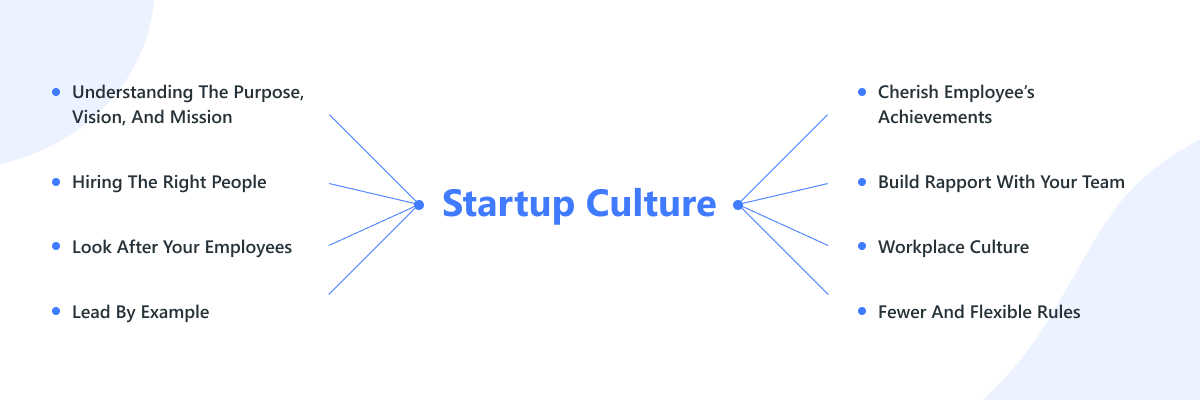Startup culture is something that most entrepreneurs think they know but don’t.
I’ve discussed the same topic with some young entrepreneurs and most of them had the same answers.
-
- Employee recognition
- Good salary
- An excellent work environment to thrive. And so on.
Yes, the points above mentioned are required. But when I raised a follow-up question I knew they had no idea what startup culture is.
The question was simple: How do you intend on implementing this?
There was some “Ahm”, “I mean, we can…” and a lot of silence.
Believe me when I say this, when you are starting a startup businessit is a must that you have a culture in place. Without that, you’ll be like a man with a blindfold trying hard to hit the bullseye.
In this blog, you’ll understand what startup culture is, why is it important and how you can build a strong culture. I’m sure the examples I provide will be helpful to you to better understand the core of building a culture.
What is Startup Culture?
I have talked about the three main components every young entrepreneur thinks of while hearing about “startup culture”. But what startup cultures really are:
-
-
- Flat-hierarchy
- Open Communication
- And freedom to work with one’s passion and thought
-
In theory, it is just the three. But in reality, it is much and more.
To take an example from the culture at NeoITO. I’ve seen team leads learning from interns, the casual communication between colleagues and departments irrespective of their designation, and of course how efficient the employees work when they were given that freedom and space to work their passion. And that is one of the reasons why NeoITO is growing.
1. Importance of having a startup culture for your business
It will be inevitable for anyone using LinkedIn read through posts stating how employees are more important than customers and when a business takes care of the employees they will indeed take care of the customers. And when starting a business, this is exactly what one should do.
Hire the right people and take care of them, they will help you through thick and thin.
Moreover, it depends upon the culture you provide that decides whether the employees stay or scoot. While this is a universal thing, startups, unlike corporate companies, can’t afford such vacancies. It cost the business vital time and resources to replace the seat.
And the level of creativity and innovation your startup team can come up with solely depends on the kind of culture you provide. So in a way, startup culture is a way of producing a highly productive team as well.
Now that we have learned the importance of having a culture, we can move on to the next part: Corporate culture and how it differs from startup culture.
2. Corporate culture vs Startup culture

Corporate culture is the elite form of startup culture. It has a hierarchy set in place, guidelines and rules in place for a more strict work environment.
To better understand it, consider the following examples.
Anderson is a full stack developer. He likes things in order and in his grasp. He has set time and time limits for each of his tasks, even things happening in his daily life. It’s all about precision and order for him. He plans and coordinates everything accordingly.
Now here is Neo. He too is a full stack developer but, unlike Anderson, he likes to explore. It is not about bringing order but finding better ways to efficiently work. To create something new, something awe, he likes doing his job that way. The risk factor, though present, doesn’t keep him from working on her creative part.
You might’ve already understood who represents who. Anderson represents the corporate culture and Neo the startup culture. Much like the Anderson and Neo in the film Matrix
Who is in Charge of Building a Culture?
I mean, duh, it usually is the person or persons who are starting a business. But it’s not just about creating good culture, it’s about transferring that energy throughout the company.
I’ve already talked about how Faiz, CEO of NeoITO, had done it in the student startup guide. It went like this, the company was still a startup then and Faiz was interviewing a candidate.
He asked the candidate, what would he do if he got a client work that required the involvement of the 100% workforce but 80% of the workforce is already committed.
The candidate indeed replied that he would work with the remaining 20%, which was the wrong answer.
The right answer to it was, to tell the client the truth and let them make the decision. To wait or to move on. And Faiz added to his answer that clients would come, but loyal and hardworking employees would not.
In that few moments, Faiz had given the candidate what he and his company is. The candidate got hired, played his role, learned many things, and is now the COO of the company. That’s the power NeoITO’s culture has produced.
And now we move on to learn how to build one for your startup company.
How to Build a Strong Culture for Your Startup?

1. Understanding the vision, purpose, and mission of your company
As a founder, it will be your responsibility to set a purpose, vision and mission for your startup.
Example: Following are the NeoITO’s
-
-
- Purpose: We exist to help people transform their ideas into turnkey technology that creates a positive impact on people’s lives.
- Vision: To be the go-to technology partner for entrepreneurs, where they can unleash the potential of their ideas & positively shape the future we live in.
- Mission: We make enterprise-grade product development more accessible to entrepreneurs, helping them compete on a bigger scale while still staying nimble.
-
By having these three you can lead your team forward without detouring from your end goal.
2. Hire the right people
Hiring at an early stage is a difficult task, especially when you are looking for candidates with passion. While experience is a core factor for certain positions, you shouldn’t always look for it.
We at NeoITO give more importance to hiring candidates with expertise than experience.
3. Look after your employees
Well, when you bring someone under your organisation it is the duty of the founder to take care of their needs. They won’t open up about their difficulties, at least not always. So, it will be your responsibility to approach them. And HR teams can you here.
Be more casual and informal in the way you approach them, make them feel comfortable and you will get to know them. Consequently, you can take good care of them.
4. Lead by example
A bit cliche, but effective nonetheless. I’ve witnessed it countless times at our firm as well.
Faiz, Founder of NeoITO, roams through the company sitting beside the employees, talking with them, learning from them and even parting his knowledge. He said it’s way better than asking them to meet him in his office.
And the best part is that, if the employees see you doing such things then they will be motivated to do the same. And this way, you can ensure that the culture you built stays intact throughout the company.
5. Cherish employees’ achievements
Mental health has been a crucial topic everyone discussed since the first wave of the pandemic. And in times when everyone is working distantly from their home, a bit of recognition can do good. Acknowledging and cherishing their achievements will create positive energy in them.
If possible, consider giving incremental rewards as well depending on the level of work an employee is putting in. They are working to live not living to work.
6. Build rapport with your team
Now, this is the most important thing when building a work culture.
Remember the vision, purpose and mission we discussed earlier. Discuss and share those with your team. Make them understand why you are doing the things you are doing and what should be the goal everyone should focus on.
If you have read our vision, purpose and mission, you may have understood that we are here to help all entrepreneurs develop their dream businesses.
7. Positive workplace culture
Create a workplace where your employees can relax a bit and get comfortable, which doesn’t get fulfilled with a couple of beanbags and a coffee machine. It’s about the shared value, attitude, and belief system in place for the team members to work together and yield the best results.
A good workplace culture reduces the stress on the employees and increases team collaboration and work performance.
8. Fewer and flexible
There have to be certain rules and regulations set in place but make sure that they are fewer and more flexible. The idea is to reduce the stress and increase freedom, so keep this in mind while you are devising rules for your organisation.
For example, try to avoid dress codes. Let the employees wear the cloth they feel comfortable in.
Maintaining the Culture While Growing
This is an essential step to consider and is one of the places where you, as a founder/CEO, have partial or minimal control over.
The employee strength while starting up and growing has a considerable difference, and you might not be able to reach out to each one personally. So, this leaves only one other option to choose from. Initial hirees.
We have talked about how important it is to hire the right employees, and spreading the culture you have made is yet another purpose they can do.
Your business will grow eventually or perhaps you scale it, either way, the hiring process will undergo and new members will join your family. And now, it’ll be the employees present who is responsible for passing on the culture to the newcomers. So, how you treat your team members plays a crucial role here.
If the culture you have created is good, then the above-mentioned process will undergo automatically. Imagine, you went to a restaurant where the food and ambience were great. And you will certainly recommend the restaurant to others, right? The same logic works here.
NeoITO Culture
I’ve already provided a sneak peek into the culture NeoITO has created. If you have read our purpose, vision and mission, then you know we work to help startups and startup founders. And so, I can’t help but describe a few more activities and steps we have taken here to enrich the workplace culture. Hope some of these will give an idea on creating your own.
-
-
- Flexible rule – Employees are not restricted from leaving the firm early, on a working day, in case of any need or urgency. Sometimes one needs to relax their troubled mind to be productive.
- Frank communication – Informal and candid communication has built a rapport between employees and departments.
- Fun Friday – Half an hour-long entertainment time for all the employees by playing fun games.
- No Dress code – Any decent clothes are fine, just as long as the employees feel comfortable.
- Sport – Yearly football tournaments, weekly football matches, and more.
- Team lunch – Well, I don’t think I need to explain this.
- Anniversary celebration – All team members are honoured for their hard work and of course, food and games to celebrate.
- Trip – Yearly fun-filled getaways to refresh the minds, replenish the body and bond as a family.
-
Examples of Good Startup Culture
I’ve compiled a small list of companies that have the best of the best startup culture.
-
-
- Spotify
- Buffer
- Wistia
- Zapos
- Playlociy
- Certain Affinity
- Auth0
-
Takeaway
Startup culture is like those rare topics that people can’t be taught but only can be guided. The strength of the culture depends on the person developing it and the end goal he/she has in mind.
Talk with people working at startups, or even better, work at a startup. Within close proximity, you can observe the work environment, the kind of communication, and much more. Jot down the things that made you awe, and specifically jot at the things that you felt jarring. And from it create your own culture.
Building a successful startup starts from your business ideas, but startup culture strengthens the foundation on which you build your business. The next step, if you are wondering, is to conduct proper market research and understand the marketplace.
Hope this was helpful to you. Share your thoughts on the startup culture around the world in the comments below.
Also Read: Turning Ideas into Awesome Apps: What Makes NeoITO Mobile App Development Team Unique




